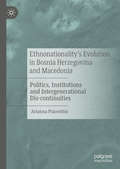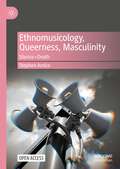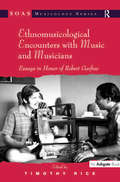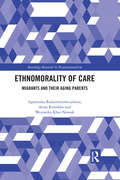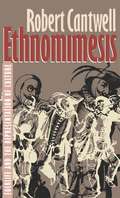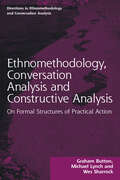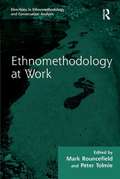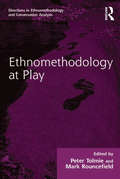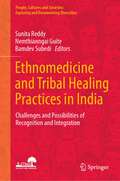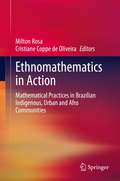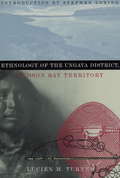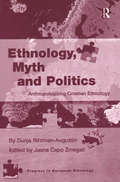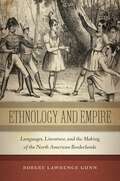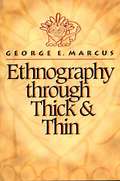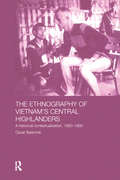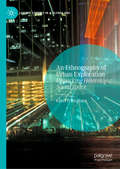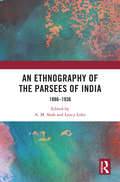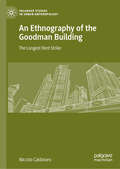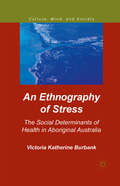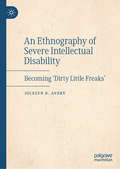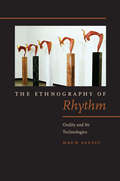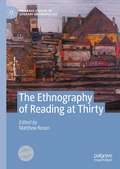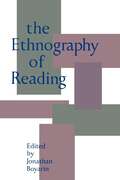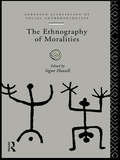- Table View
- List View
Ethnonationality’s Evolution in Bosnia Herzegovina and Macedonia: Politics, Institutions and Intergenerational Dis-continuities
by Arianna PiacentiniThis book is centred upon the concept of ‘ethnonationality,’ investigating how its meanings and functions have changed across political regimes, time, and generations. Piacentini explores two similar yet different realities, Bosnia Herzegovina and Macedonia (now North Macedonia) – both former Yugoslav republics, multiethnic, and currently characterised by consociational arrangements and ethnic politics. This temporal perspective encompasses both the Yugoslav and post-Yugoslav period, empirically exploring two generations living together in the same family, each socialised by different macro-environments and socio-political and economic conditions. The book explores which ideas, rules, and patterns of behaviour related to ethnonationality have been transmitted between the generations. Ethnonationality’s Evolution in Bosnia Herzegovina and Macedonia will be of interest to students and scholars across a range of disciplines, including sociology, politics, and conflict studies.
Ethnomusicology, Queerness, Masculinity: Silence=Death
by Stephen AmicoThis open access book explores the disciplinary, disciplined, and recent interdisciplinary sites and productions of ethnomusicology and queerness, arguing that both academic realms are founded upon a destructive masculinity—indissolubly linked to coloniality and epistemic hegemony—and marked by a monologic, ethnocentric silencing of embodied, same-sex desire. Ethnomusicology’s fetishization of masculinizing fieldwork; queerness’s functioning as Anglophone master category; and both domains’ devaluation of sensuality and experience, concomitant with an adherence to provincial, Western conceptions of knowledge production, are revealed as precluding the possibilities for equitable, dialogic pluriversality. Enlisting the sonic as theoretical intervention, the disciplined/disciplining ethno and queer are reimagined in relation to negative emotions and intractable affect, ultimately vanquished, and replaced by explorations of sound, sex/uality, and experiential somaticity within a protean, postdisciplinary space of material/epistemic equity. This uncompromising, long-overdue critique will be of interest to researchers and students from numerous theoretical backgrounds, including music, sound, gender, queer, and postcolonial/decolonial studies.
Ethnomusicological Encounters with Music and Musicians: Essays in Honor of Robert Garfias (Soas Studies In Music Ser.)
by Timothy RiceDesigned as a tribute to Robert Garfias, who has conducted field work in more cultures than any other living ethnomusicologist, this volume explores the originating encounter in field work of ethnomusicologists with the musicians and musical traditions they study. The nineteen contributors provide case studies from nearly every corner of the world, including biographies of important musicians from the Philippines, Turkey, Lapland, and Korea; interviews with, and reports of learning from, musicians from Ireland, Bulgaria, Burma, and India; and analyses of how traditional musicians adapt to the encounter with modernity in Japan, India, China, Turkey, Afghanistan, Morocco, and the United States. The book also provides a window into the history of ethnomusicology since all the contributors have had a relationship with the University of Washington, home to one of the oldest programs in ethnomusicology in the United States. Inspired by the example of Robert Garfias, they are all indefatigable field researchers and among the leading authorities in the world on their particular musical cultures. The contributions illustrate the core similarities in their approach to the discipline of ethnomusicology and at the same time deal with a remarkably wide range of perspectives, themes, issues, and theoretical questions. Readers should find this collection of essays a fascinating, indeed surprising, glimpse into an important aspect of the history of ethnomusicology.
Ethnomorality of Care: Migrants and their Aging Parents (Routledge Research in Transnationalism)
by Agnieszka Radziwinowiczówna Anna Rosińska Weronika Kloc-NowakWhat happens when the parents of migrants age and need care in mobile and aging societies? Ethnomorality of Care acts as a window in sharing how physical distance challenges family-centered elderly care by juxtaposing transnational families with non-migrant families. <P><P>A novel approach that explores intentions and moral beliefs concerning elderly care alongside practical care arrangements, Ethnomorality of Care presents a concept of care which recognizes how various factors shape the experience of care, including: national, regional, and local contexts, economic inequalities, gender, care and migration regimes. Based on the findings of a multi-sited research carried out between 2014 and 2017 in Poland and the UK, this perceptive volume also seeks to demonstrate how researchers and practitioners can use ethnomorality of care approach to examine non-migrant families and other types of care. <P><P>Helping readers to better understand the lived experience of care receivers and givers beyond kinship care, Ethnomorality of Care will appeal to graduate students, researchers, policy makers and care practitioners interested in fields such as migration studies, transnational studies and social and cultural gerontology.
Ethnomimesis
by Robert S. CantwellWide-ranging and provocative, this book will fascinate all those intrigued by how we create and perpetuate our representations of folklife and culture. Ethnomimesis is Robert Cantwell's word for the process by which we take cultural influences, traditions, and practices to ourselves and then manifest them to others. Ethnomimesis is an element of ordinary social communication, but springing out of it, too, is that extraordinary summoning up that produces our literature, our art, and our music. In the broadest sense, ethnomimesis is the representation of culture. Using such diverse cultural artifacts as King Lear and an eighteenth-century English manor garden to deepen our understanding of ethnomimesis, Cantwell then explores at length the representation of culture in our national museum, the Smithsonian, focusing especially on the Festival of American Folklife. Like many other such exhibitions, the Festival enacts presentations of culture across the boundaries of rank and class, race and ethnicity, gender and the life cycle. Like the concept of 'folklife' itself, Cantwell argues, the Festival stands where ethnomimesis finds its creative source, at the cultural frontier between self and other. That boundary, and the energy that accumulates there, runs through the many, varied 'exhibits' of this book.
Ethnomethodology, Conversation Analysis and Constructive Analysis: On Formal Structures of Practical Action (Directions in Ethnomethodology and Conversation Analysis)
by Graham Button Michael Lynch Wes SharrockThis book revisits the arguments by which Harvey Sacks and Harold Garfinkel opposed the widespread attempt in the social sciences to construct disciplinary theories and methods in place of common-sense knowledge of human action, and proposed instead an alternative that would investigate the organised methods of natural language use and common-sense reasoning that constitute social orders – arguments that led to the establishment and proliferation of ethnomethodology and conversation analysis. As the very "constructive analysis" that they opposed has begun to be incorporated into influential lines of research in ethnomethodology and conversation analysis, the authors return to the founding insights of the field and reiterate the importance of Garfinkel and Sacks’ original and controversial proposals for an "alternate" sociology of practical action and practical reasoning. Showing how constructive analysis has become entrenched in ethnomethodology and conversation analysis and arguing for a need to "re-boot" these approaches, this volume constitutes a call for a renewal of the radical alternative proposed by Garfinkel and Sacks.
Ethnomethodology at Work (Directions in Ethnomethodology and Conversation Analysis)
by Peter Tolmie Mark RouncefieldBringing together one of the most important bodies of research into people's working practices, this volume outlines the specific character of the ethnomethodological approach to work, providing an introduction to the key conceptual resources ethnomethodology has drawn upon in its studies, and a set of substantive chapters that examine how people work from a foundational perspective. With contributions from leading experts in the field, including Graham Button, John Hughes and Wes Sharrock, Ethnomethodology at Work explores the contribution that ethnomethodological studies continue to make to our understanding of the ways in which people actually accomplish work from day to day. As such, it will appeal not only to those working in the areas of ethnomethodology and conversation analysis, but also to those with interests in the sociology of work and organisations.
Ethnomethodology at Play (Directions in Ethnomethodology and Conversation Analysis)
by Peter Tolmie Mark RouncefieldThis book outlines the specific character of the ethnomethodological approach to 'play'; that is, to everyday sport and leisure activities that people generally engage in for enjoyment, at home or as a 'hobby'. With chapters on cooking, running, playing music, dancing, rock climbing, sailing, fly fishing and going out for the day as a family, Ethnomethodology at Play provides an introduction to the key conceptual resources drawn upon by ethnomethodology in its studies of these activities, whilst exploring the manner in which people 'work' at their everyday leisure. Demonstrating the breadth of ethnomethodological analysis and showing how no topic is beyond ethnomethodology's fundamental respecification, Ethnomethodology at Play sets out for the serious reader and researcher the precise contribution of ethnomethodology to sociological studies of sport and leisure and ordinary domestic pastimes. As such this groundbreaking volume constitutes a significant contribution to both ethnomethodology and sociology in general, as well as to the sociology of sport and leisure, the sociology of domestic and daily life and cultural studies.
Ethnomedicine and Tribal Healing Practices in India: Challenges and Possibilities of Recognition and Integration (People, Cultures and Societies: Exploring and Documenting Diversities)
by Sunita Reddy Nemthianngai Guite Bamdev SubediThis book examines various aspects of ethnomedicine and tribal healing practices, including its importance for inclusion and integration from a health systems perspective. Tribal healing practices is an under-studied component in healthcare system, health policy and health systems research. The book consists of original research papers based on empirical studies done by anthropologists, sociologists, public health practitioners and research scientists in various parts of India. It discusses issues of non-codified folk healing, with a focus on the therapeutic ideas and practices of tribal communities, located in anthropological theory and methods. It has a balance of empirical papers, review and theoretical papers, not only explaining ‘what is inside the healing practices’ but also touching upon the question of ‘why’ and delving into ‘what should be’ looking into the possibility to apply it for a larger good i.e., health care for all. This book discusses several important issues related to legitimacy, evidence and efficacy, recognition, certification and integration, protection and preservation, bio-piracy and bioprospecting, benefit sharing and intellectual property rights, sustainable use of medicinal herbs and conservation of nature and natural resources, biodiversity and possibilities of mainstreaming tribal healing. It is of interest to students and researchers from medical anthropology, medical sociology, cultural geography, liberal studies, tribal studies, ecology, sustainability and development and public health.
Ethnomathematics in Action: Mathematical Practices in Brazilian Indigenous, Urban and Afro Communities
by Milton Rosa Cristiane Coppe de OliveiraThis book presents a collection of ethnomathematical studies of diverse mathematical practices in Afro-Brazilian, indigenous, rural and urban communities in Brazil. Ethnomathematics as a research program aims to investigate the interrelationships of local mathematical knowledge sources with broader universal forms of mathematics to understand ideas, procedures, and practices found in distinct cultural groups. Based on this approach, the studies brought together in this volume show how this research program is applied and practiced in a culturally diverse country such as Brazil, where African, indigenous and European cultures have generated different forms of mathematical practice. These studies present ethnomathematics in action, as a tool to connect the study of mathematics with the students’ real life experiences, foster critical thinking and develop a mathematics curriculum which incorporates contributions from different cultural groups to enrich mathematical knowledge. By doing so, this volume shows how ethnomathematics can contribute in practice to the development of a decolonial mathematics education. Ethnomathematics in Action: Mathematical Practices in Brazilian Indigenous, Urban and Afro Communities will be of interest to educators and educational researchers looking for innovative approaches to develop a more inclusive, democratic, critical, multicultural and multiethnic mathematics education.
Ethnology of the Ungava District, Hudson Bay Territory
by Lucien M. Turner Stephen LoringLucien Turner arrived at the present-day community of Kuujjuaq on the northern Quebec-Labrador peninsula in 1882. As with his earlier long-term appointments in Alaska, he primarily conducted meteorological, atmospheric, and tidal observations for the U.S. Army's Signal Corps. But he also developed a meaningful rapport with the Innu and Inuit, spending his free time studying and recording not only their material culture--including clothing, dwellings, weapons, and tools--but also their lifeways, language, and stories. His images of these people and their camps are among the earliest examples of photography of the Arctic. As Stephen Loring Notes in the introduction, "With few exceptions--Inuit shamanistic paraphernalia and Innu hunting charms--the majority of the materials Turner collected were artifacts and clothing used in day-to-day activities. The passage of time and the miracle of conservation have transformed these ethnographic minutiae, these objects and materials of relatively minor significance on the past, into treasured cultural icons." Especially notable for Lucien Turner's descriptions of nineteenth-century Native material culture, Ethnology of the Ungava District, Hudson Bay Territory was originally published in 1894 as part of the Smithsonian's Annual Report of the Bureau of American Ethnology series--often considered to mark the beginning of American anthropological studies. This reissue ensures that Turner's work continues to be a classic introduction to the culture of the Innu and Inuit people of northern Quebec and Labrador.
Ethnology, Myth and Politics: Anthropologizing Croatian Ethnology (Progress in European Ethnology)
by Dunja Rihtman-Augustin Jasna Capo ZmegacThe book offers a critical overview of Croatian ethnology written by the most prominent Croatian ethnologist/ anthropologist in the second half of the 20th century - Dunja Rihtman-Augustin (recently deceased). She was the first Croatian ethnologist to break with the long established tradition of diffusionist (culture area) studies of her contemporaries and start to anthropologize Croatian ethnology. This book, compiled and completed by Jasna Capo Zmegac, highlights some crucial remarks with regard to the relationship between ethnology and politics. They are formulated as a series of research questions and problems, including: the role of folk culture as mythomoteur, cannonization of the folk culture, nationalization of the peasants in the 19th century and the role of ethnology. This vividly written text offers an exceptional insight into Croatian ethnological developments in the past century, as well as into crucial ruptures in Croatian society which have had important repercussions on ethnological discipline.
Ethnology and Empire: Languages, Literature, and the Making of the North American Borderlands (America and the Long 19th Century #6)
by Robert Lawrence GunnEthnology and Empire tells stories about words and ideas, and ideas about words that developed in concert with shifting conceptions about Native peoples and western spaces in the nineteenth-century United States. Contextualizing the emergence of Native American linguistics as both a professionalized research discipline and as popular literary concern of American culture prior to the U.S.-Mexico War, Robert Lawrence Gunn reveals the manner in which relays between the developing research practices of ethnology, works of fiction, autobiography, travel narratives, Native oratory, and sign languages gave imaginative shape to imperial activity in the western borderlands. In literary and performative settings that range from the U.S./Mexico borderlands to the Great Lakes region of Tecumseh's Pan-Indian Confederacy and the hallowed halls of learned societies in New York and Philadelphia, Ethnology and Empire models an interdisciplinary approach to networks of peoples, spaces, and communication practices that transformed the boundaries of U.S. empire through a transnational and scientific archive. Emphasizing the culturally transformative impacts western expansionism and Indian Removal, Ethnology and Empire reimagines U.S. literary and cultural production for future conceptions of hemispheric American literatures.
Ethnography through Thick and Thin
by George E. MarcusIn the 1980s, George Marcus spearheaded a major critique of cultural anthropology, expressed most clearly in the landmark book Writing Culture, which he coedited with James Clifford. Ethnography through Thick and Thin updates and advances that critique for the late 1990s. Marcus presents a series of penetrating and provocative essays on the changes that continue to sweep across anthropology. He examines, in particular, how the discipline's central practice of ethnography has been changed by "multi-sited" approaches to anthropology and how new research patterns are transforming anthropologists' careers. Marcus rejects the view, often expressed, that these changes are undermining anthropology. The combination of traditional ethnography with scholarly experimentation, he argues, will only make the discipline more lively and diverse.The book is divided into three main parts. In the first, Marcus shows how ethnographers' tradition of defining fieldwork in terms of peoples and places is now being challenged by the need to study culture by exploring connections, parallels, and contrasts among a variety of often seemingly incommensurate sites. The second part illustrates this emergent multi-sited condition of research by reflecting it in some of Marcus's own past research on Tongan elites and dynastic American fortunes. In the final section, which includes the previously unpublished essay "Sticking with Ethnography through Thick and Thin," Marcus examines the evolving professional culture of anthropology and the predicaments of its new scholars. He shows how students have increasingly been drawn to the field as much by such powerful interdisciplinary movements as feminism, postcolonial studies, and cultural studies as by anthropology's own traditions. He also considers the impact of demographic changes within the discipline--in particular the fact that anthropologists are no longer almost exclusively Euro-Americans studying non-Euro-Americans. These changes raise new issues about the identities of anthropologists in relation to those they study, and indeed, about what is to define standards of ethnographic scholarship.Filled with keen and highly illuminating observations, Ethnography through Thick and Thin will stimulate fresh debate about the past, present, and future of a discipline undergoing profound transformations.
Ethnography, Superdiversity and Linguistic Landscapes
by Jan BlommaertSuperdiversity has rendered familiar places, groups and practices extraordinarily complex, and the traditional tools of analysis need rethinking. In this book, Jan Blommaert investigates his own neighbourhood in Antwerp, Belgium, from a complexity perspective. Using an innovative approach to linguistic landscaping, he demonstrates how multilingual signs can be read as chronicles documenting the complex histories of a place. The book can be read in many ways: as a theoretical and methodological contribution to the study of linguistic landscape; as one of the first monographs which addresses the sociolinguistics of superdiversity; or as a revision of some of the fundamental assumptions of social science through the use of chaos and complexity theory as an inspiration for understanding the structures of contemporary social life.
The Ethnography of Vietnam's Central Highlanders: A Historical Contextualization 1850-1990 (Anthropology of Asia)
by Oscar SaleminkThis book looks at ethnographic discourses concerning the indigenous population of Vietnam's Central Highlands during periods of christianization, colonization, war and socialist transformation, and analyses these in their relation to tribal, ethnic, territorial, governmental and gendered discourses. Salemink's book is a timely contribution to anthropological knowledge, as the ethnic minorities in Vietnam have (again) been the object of fierce academic debate. This is a historically grounded post-colonial critique relevant to theories of ethnicity and the history of anthropology, and will be of interest to graduate students of anthropology and cultural studies, as well as Vietnam studies.
An Ethnography of Urban Exploration: Unpacking Heterotopic Social Space (Leisure Studies in a Global Era)
by Kevin P. BinghamThis book analyses a unique leisure world that has been built around a newly emerging phenomenon known as urban exploration; the art of exploring human-made environments which are generally abandoned or hidden from sight of the public eye. Drawing on Michel Foucault’s concept of heterotopia, Bingham provides a detailed and critical investigation of urban exploration as a form of leisure that is about the coming together of drifting performers who, in their celebration of ‘rebellion’ and ‘deviance’, are determined to find a sense of meaning and belonging. The research considers the influence of consumer capitalism on urban explorers, and the wider social, economic and political context that shapes ideas of belonging and identity in the twenty-first century. By doing this, the book analyses urban exploration as an activity that has emerged in a time when human ideas about culture, individuality and community have transformed, and ‘solid’ modernity is gradually disintegrating around us. This multi and interdisciplinary work will appeal to people with an interest in ‘abnormal’ or ‘deviant’ leisure, as well as academics from sociology, anthropology, social geography, leisure studies, cultural studies, sport and recreation and tourism.
An Ethnography of the Parsees of India: 1886–1936
by A. M. Shah and Lancy LoboThis volume explores a wide spectrum of Parsee culture and society derived through essays from the Journal of Anthropological Society of Bombay (1886–1936). This journal documents intensive scholarship on the Parsee community by eminent anthropologists, Indologists, orientalogists, historians, linguists, and administrators in the late 18th and early 19th centuries. Comprising 0.05% of India’s total population today, the Parsees (now spelled “Parsis”) have made significant contributions to modern India. Through contributions of Jivanji Jamshedji Modi, Bomanjee Byramjee Patell, and Rustamji Munshi, eminent Parsee scholars, the essays in this book discuss the social and cultural frameworks which constitute various key phases in the Parsee life nearly 100 years ago. They also focus on themes such as birth, childhood and initiation, marriage, and death. The volume also features works on Parsee folklore and oral literature. An important contribution to Parsi culture and living, this book will be of great interest to scholars and researchers of sociology, social anthropology, ethnography, cultural studies, history, and South Asia studies.
An Ethnography of the Goodman Building: The Longest Rent Strike (Palgrave Studies in Urban Anthropology)
by Niccolo Caldararo“An Ethnography of the Goodman Building vividly incorporates a wide variety of methods to tell the story of class struggle in a building, neighborhood, and city that is replicated globally. I read it as a number of boxes inside each other opened in the course of reading. Caldararo recounts the building’s personal “biography” to convey not only the “facts about,” but the “feelings about” the flesh and blood of the building and its surrounding neighborhood.” —Jerome Krase, Brooklyn College of The City University of New York, USA “This unique contribution to the field of urban and regional studies counteracts current trends in the ethnographies of urban movements by offering, with great hindsight, an analysis from a physical space, and from first-hand experience. The focal point is one building, and the author is a former tenant. This perspective is appealing, especially in an era of global connections where macro social movements are on the front line of urban life and research.” —Nathalie Boucher, Director and Researcher, Respire, and Affiliated Professor Assistant, Department of Sociology and Anthropology, Concordia University, Canada.Through in-depth analysis and narrative investigation of an actual building occupation, Niccolo Caldararo seeks to not only offer an historical account of the Goodman Building in San Francisco, but also focus on the active resistance tactics of its residents from the 1960s to the 1980s. Taking as its focal point the building itself, the volume weaves in and out of every life involved and the struggles that surround it—San Francisco’s urban renewal, ethnic clearing, gentrification, and municipal governance at a time of booming urban growth. Caldararo, a tenant at the center of its strikes and activities, provides a unique perspective that counteracts current trends in ethnographies of urban movements by grounding its analysis in physical and tangible space.
An Ethnography of Stress: The Social Determinants of Health in Aboriginal Australia (Culture, Mind, and Society)
by Victoria Katherine BurbankThis book examines the global issue of health inequality through an in-depth look at a remote Australian Aboriginal community characterized by premature morbidity and mortality.
An Ethnography of Severe Intellectual Disability: Becoming 'Dirty Little Freaks'
by Jocelyn D. AveryIn this ethnographic investigation of a special education needs college in Australia, Jocelyn D. Avery explores how the self-identity of people with severe intellectual identities is influenced by carers and support people in their lives. Employing theoretical foundations of self-identity and embodiment and drawing largely on Mary Douglas’s (1996) notions of ritual and hygiene, purity and danger, Avery argues that students in this environment are treated as though they exist in a vacuum, rather than a highly complex social environment: strategies to ‘contain’ their difficult selves ultimately lead to continued confinement, as if the students themselves were ‘contaminated’. In the midst of this much-needed ethnography, Avery meditates on her own role: matters of consent, communication, and cooperation pose a challenge to anthropological engagement with severe intellectual disability, but researcher ethics and positionality have their own difficulties. The reflection provided here will provide a guide for future researchers to sensitively engage with people with disability.
The Ethnography of Rhythm: Orality and Its Technologies
by Haun SaussyWho speaks? The author as producer, the contingency of the text, intertextuality, the “device”—core ideas of modern literary theory—were all pioneered in the shadow of oral literature. Authorless, loosely dated, and variable, oral texts have always posed a challenge to critical interpretation. When it began to be thought that culturally significant texts—starting with Homer and the Bible—had emerged from an oral tradition, assumptions on how to read these texts were greatly perturbed. Through readings that range from ancient Greece, Rome, and China to the Cold War imaginary, The Ethnography of Rhythm situates the study of oral traditions in the contentious space of nineteenth- and twentieth-century thinking about language, mind, and culture. It also demonstrates the role of technologies in framing this category of poetic creation. By making possible a new understanding of Maussian “techniques of the body” as belonging to the domain of Derridean “arche-writing,” Haun Saussy shows how oral tradition is a means of inscription in its own right, rather than an antecedent made obsolete by the written word or other media and data-storage devices.
The Ethnography of Reading at Thirty (Palgrave Studies in Literary Anthropology)
by Matthew RosenThis edited volume examines what the classic text The Ethnography of Reading (Boyarin ed., 1993), and the diverse ethnographies of reading it helped inspire, can offer contemporary scholars interested in understanding the place of reading in social life. The Ethnography of Reading at Thirty brings together new research and critical reflections from an international and interdisciplinary group of scholars who have kept their ears tuned to the voices in and around the texts they encountered and constructed in the process of bringing the ethnography of reading into the twenty-first century. Rather than operating from universalist assumptions about how people interact with and make meaning from written texts, each of the present contributors draw in one way or another on the theoretical, methodological, and creative legacies of The Ethnography of Reading. Under the broad umbrella of ethnographic reader studies, they collectively explore new relations between texts, social imagination, and social action.
The Ethnography of Reading
by Jonathan BoyarinWriting, the subject of much innovative scholarship in recent years, is only half of what we call literacy. The other half, reading, now finally receives its due in these groundbreaking essays by a distinguished group of anthropologists and literary scholars.The essays move well beyond the simple rubric of "literacy" in its traditional sense of evolutionary advancement from oral to written communication. Some investigate reading in exotically cross-cultural contexts. Some analyze the long historical transformation of reading in the West from a collective, oral practice to the private, silent one it is today, while others demonstrate that in certain Western contexts reading is still very much a social activity. The reading situations described here range from Anglo-Saxon England to contemporary Indonesia, from ancient Israel to a Kashaya Pomo Indian reservation.Filled with insights that erase the line between orality and textuality, this collection will attract a broad readership in anthropology, literature, history, and philosophy, as well as in religious, gender, and cultural studies.
The Ethnography of Moralities (European Association of Social Anthropologists)
by Signe HowellFocusing on the social construction of morality, The Ethnography of Moralities discusses a topic which is complex but central to the study and nature of anthropology. With the recent shift towards an interest in indigenous notions of self and personhood, questions pertaining to the moral and ethical origins of beliefs relating to human rights become increasingly relevant. Some of the questions that the contributors address are: * How is the ethical knowledge grounded? * Which social domains most profoundly articulate moral values and which are most affected?* Who defines and who enforces what is right and wrong? * What constitutes an ethical breach? Suggested answers are made with reference to empirical material so that the complexities and varieties of theoretical and methodological issues are highlighted. They are also discussed with reference to a wide array of ethnographic studies from Argentina, Mongolia, Melanesia, Yemen, Zimbabwe, Mexico, Britain and The Old Testament.
